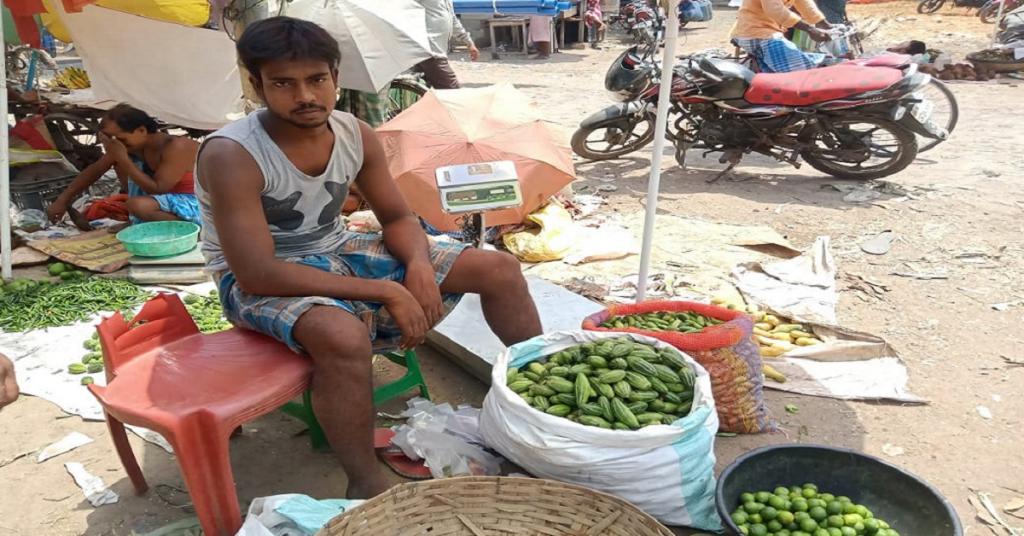
Blazing Prices Of Goods, Unemployment; Poor In Bengal Feel Anguished And Helpless Prices Of Essentials Seem To Be Consistently Growing In The Post-Pandemic World
31, Oct 2022 | Mohammed Ripon Sheikh
It’s been a rough year for retailer Serjahan Sheikh, a resident of Birbhum who owns a small business that runs his household. Strangely, the supply of almost every commodity that he needs for his business has suddenly declined. In his own words, “The wholesale prices of goods have also increased thereby impacting the retail market. Sales have also declined due to rising prices. People, like us, with limited income are struggling to meet their daily needs.” Farmers are suffering the same fate. The price of chemical fertilizers have gone up by 30% since the start of 2022, following last year’s 80% surge. It’s becoming increasingly difficult to get a fair price on their crops. Consequently, storekeepers are buying vegetables from farmers and in that process creating an artificial market by stocking vegetables. Even though this enables the storekeepers to get some benefit, the farmers are deprived.
The price of essential commodities in the market has risen abnormally in recent times, especially in this post pandemic world, bringing immense misery in the lives of those that are unable to save or lean on daily income for their livelihoods. Sheikh pointed out, “ Not only groceries, prices of electronic items, medicine, petrol, diesel, textiles, and textbooks, everything is rapidly increasing but our income is not, Our expenditure is becoming more than our income.” As a result of this, mental stress is increasing in society. A Government report pointed out that over 30 suicides have been taking place everyday since 2020 because of poverty. Boys and girls from poor families are being forced to drop out of school. The conditions in certain villages have gotten so worse that people are being forced to exchange household goods for rice.
CJP’s Grassroots Fellowship Program is a unique initiative aiming to give voice and agency to the young, from among the communities with whom we work closely. These presently include migrant workers, Dalits, Adivasis and forest workers. CJP Fellows report on issues closest to their hearts and home, and are making impactful change every day. We hope to expand this to include far reaching ethnicities, diverse genders, Muslim artisans, sanitation workers and manual scavengers. Our raison d’etre is to dot India’s vast landscape with the committed human rights workers who carry in their hearts Constitutional values, to transform India into what our nation’s founders dreamt it to be. Please Donate Now to increase the band of CJP Grassroot Fellows.
To top this off, many migrant workers are returning home from different states of India, post lockdown. Many migrant workers do not want to go to work thinking about the horrors of the pandemic and the toll it took on the lower income families, who put their lives at risk to travel home on foot – which proved to be fatal to many. Even though these workers want to earn their living in their respective hometown or nearby areas, it is still not possible due to lack of jobs and general infrastructure of their villages. Many workers are unemployed because mills have shut down, the stone quarries have come under threat, small cottage industries are being taken over by bigwigs. A worker works for a daily wage of 250 – 300 rupees, if he makes any money at all. It is nearly impossible to run a family of 5-6 with that kind of income, in the present time. Many of their workers are still losing their jobs, as we read this article.
In the last two months, prices of essential commodities have risen by 30-40%. Prices of every agricultural product including rice, pulses, oil, sugar, fish and meat have gone up. The prices of some imported goods have also gone up abnormally. Two months ago, the standard rice which was sold at Rs 25 to 28 per kg is now being sold at Rs 40 to 42 per kg. The price of raw vegetables has also gone up. Mustard oil prices have also risen. Fish and meat products are nearly out of reach for lower income groups.
While the Indian economy might have surpassed that of the UK and France a few years back, the average income of an Indian remains abysmally low. The poorest districts of Bengal still go to sleep hungry, without proper healthcare or education.The closing down of regional factories, vehicle services and some services in the railways have added to the reasons for unemployment. If Central and State Governments do not immediately stand by the people, then the lives of these people won’t ever come close to being normal.
This report is part of CJP’s Grassroots Fellowship Program, and has been written by aspiring journalist and student activist Ripon Sheikh from Birbhum in West Bengal. In these reports Ripon looks at the people around him – migrant workers, the families they leave behind, agricultural labourers, women who do housework, rural artisans and young people, with a keen sense of compassion.
Meet CJP Grassroot Fellow Mohammed Ripon Sheikh

This young man, who has graduated with a B.Sc degree from Burdwan University, loves trivia. Sheikh’s passion to research and seek “unknown information about World History” has earned him many medals and trophies at various University and state-level Quiz championships, and youth festivals. Sheikh is a born orator and a natural community leader. He has the potential to represent his community, state and country at a global level one day. His immediate goal, however, is to find a job so he can support his parents.
Related:
The eternal romance of traditional farming may soon be folklore









